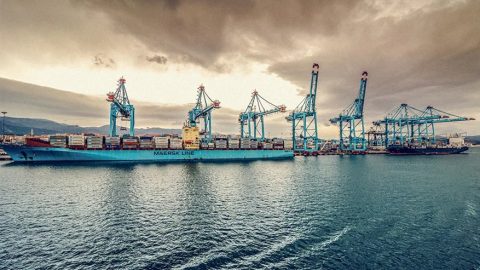
Are 2M divorcees eyeing a new fling with breakbulk?
The recent dissolution of the 2M alliance between MSC and Maersk is expected to bring more competition in the container shipping sector. However, could the dissolution have a wider effect, on markets such as project cargo and breakbulk?
Both companies have made certain moves with project cargo and breakbulk in mind, with MSC acquiring Bolloré Africa Logistics near the end of last year and Maersk completing the acquisition of its compatriot project logistics expert, Martin Bencher at the start of this year.
Traditionally, project cargo that could be containerised was transported on container vessels, however, the trend reversed over 2021/2022, when a number of companies in the multipurpose sector opted to transport containers, and market players looked for different options to alleviate their supply chain woes and avoid port congestion.
According to Lars Jensen, expert in the container shipping industry, the 2M dissolution is only the beginning of a re-shaping of the alliance/VSA constellations on especially the major east-west trades.
“This will change the competitive dynamics on the major east-west trades for all major carriers, and clearly all carriers will take a close look at which threats and opportunities this will bring forth. In essence this should be seen as the first domino of many to fall over the next one to two years,” he said in a brief statement.
Minimal to no impact on the breakbulk sector
The dissolution will mostly affect the container market with more competition, says Johan-Paul Verschuure, project director at Rebel, adding that it would have no direct impact on the breakbulk or project cargo sector.
However, he notes that the current market dynamics, of breakbulk being containerised again, will certainly leave its mark on the sector. “Increased competition in the container sector will result in lower rates and hence more breakbulk being containerised, but I think this is a relatively smaller effect in comparison to the overall decline in freight rates currently going on. Given that liners prefer to call at their own terminals, the largest impact on the shipping sector will be a reshuffling of services and boxes across the liner owned terminals,” Verschuure said.
Deputy head of research at Drewry, Ferenc Pasztor is in agreement with Verschuure in saying that any significant impact on the multipurpose sector is unlikely. “Demand for containers to be carried on multipurpose vessels was strong, and it did happen, however many larger players in the project cargo business refused to do that in order not to lose market share. The dissolution of the M2 alliance will hardly have any effect on multipurpose vessels,” Pasztor said.
No place for Maersk to go
The dissolution of the 2M alliance had always seemed plausible with the contractual clock winding down and both companies investing in their standalone services.
“MSC has been raiding the second-hand and charter markets, as well as splurging on newbuild orders. Maersk, on the other hand, has seemed content to allow MSC to take its number one rank, focusing on its vertical integration strategy. It would seem that MSC believes that it can better utilise its ships on its own, untethered by a sleepy partner,” Pasztor said.
In an earlier comment on the dissolution, Drewry’s senior manager, container research, Simon Heaney said that Maersk’s relaxed view on market share growth puts it in a tough spot.
“As things stand, Maersk will not be able to offer the same liner coverage as it does now by operating as an independent. Yet, such is its size that competition authorities will probably block any move to join one of the other two alliances, which are contractually committed beyond the termination of 2M in 2025 (Ocean Alliance runs to 2027 and THE Alliance to 2030),” Heaney said.
Verschuure adds that, even if a new alliance would be possible, the options are quite limited, and would require a major reshuffling.
“The low margins in container shipping will always push liners to look for the minimum amount of competition which is allowable. Given that in some instances it is difficult to further merge companies, alliances will keep existing as they have done for almost three decades,” he said.
Investment in project logistics
Within a month apart, both companies made acquisitions that could show their intent when it comes to breakbulk and project logistics.
In December last year, MSC closed the acquisition of Bolloré Africa Logistics while Maersk completed the acquisition of its compatriot project logistics expert, Martin Bencher at the start of this year.
MSC has already unveiled the rebranded unit, Africa Global Logistics (AGL), a multimodal logistics operator, saying the unit aims to play a major role in enabling the sustainable transformation of Africa and its emerging markets.
On the other hand, Karsten Kildahl, regional managing director in Europe of Maersk, said that the acquisition of a project logistics specialist, Martin Bencher, strengthens Maersk’s ability to offer project logistics services to its global clients while providing a more comprehensive offering to a wide array of industries.
However, only recently did the company unveil its intentions to divest Maersk Supply Service (MSS), a provider of global offshore marine services and project solutions for the energy sector.
Can alliance models be applied in the breakbulk sector?
One remains to wonder whether a major alliance could crop up in the breakbulk sector. Jumbo Maritime and SAL Heavy Lift have already gone that route in the specialised heavy-lift and project cargo sector. The question that one might ask is could the likes of MSC and Maersk look to invest their time and money in acquiring operators in the breakbulk sector.
“Given the specialist trades (and technical requirements of some cargoes) and activities, this is much harder to do. Also the size of the trades in the breakbulk sector are generally smaller due to which economies of scale or harder to obtain. These economies of scale were a key driver for the alliances on the main East-West routes,” noted Verschuure.
He does, however, ask a question whether with interest from new larger players with access to capital, and emerging new growth markets within the breakbulk domain, there may be a push for new consolidated large players to secure a significant market share?
Pasztor adds that with container freight rates dropping, more and more project cargo is expected to be carried on containerships. “Although demand growth for carrying project cargo is expected to be strong in the second half of the decade, operating multipurpose vessels by MSC/Maersk directly seems unlikely,” he says.
However, one could speculate that they do have enough buying power to acquire a multipurpose vessel operator. Only time will tell.
You just read one of our premium articles free of charge
Register now to keep reading premium articles.




